2014中考英语九年级unit1-12第一轮复习重点知识复习
中考英语复习九年级英语(全一册)Unit1---14单元知识点
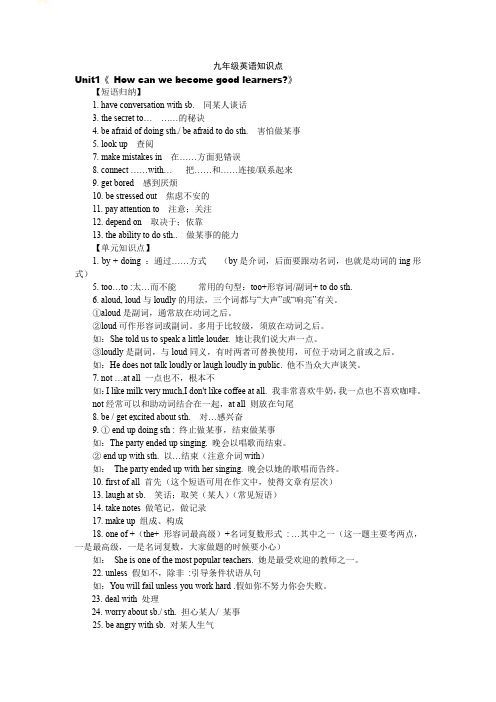
九年级英语知识点Unit1《How can we become good learners?》【短语归纳】1. have conversation with sb. 同某人谈话3. the secret to… ……的秘诀4. be afraid of doing sth./ be afraid to do sth. 害怕做某事5. look up 查阅7. make mistakes in 在……方面犯错误8. connect ……with… 把……和……连接/联系起来9. get bored 感到厌烦10. be stressed out 焦虑不安的11. pay attention to 注意;关注12. depend on 取决于;依靠13. the ability to do sth.. 做某事的能力【单元知识点】1. by + doing :通过……方式(by是介词,后面要跟动名词,也就是动词的ing形式)5. too…to :太…而不能常用的句型:too+形容词/副词+ to do sth.6. aloud, loud与loudly的用法,三个词都与“大声”或“响亮”有关。
①aloud是副词,通常放在动词之后。
②loud可作形容词或副词。
多用于比较级,须放在动词之后。
如:She told us to speak a little louder. 她让我们说大声一点。
③loudly是副词,与loud同义,有时两者可替换使用,可位于动词之前或之后。
如:He does not talk loudly or laugh loudly in public. 他不当众大声谈笑。
7. not …at all 一点也不,根本不如:I like milk very much,I don't like coffee at all. 我非常喜欢牛奶,我一点也不喜欢咖啡。
not经常可以和助动词结合在一起,at all 则放在句尾8. be / get excited about sth. 对…感兴奋9. ① end up doing sth : 终止做某事,结束做某事如:The party ended up singing. 晚会以唱歌而结束。
九年级英语中考总复习第一至十五单元要点

人教版九年级英语Units 1-15重点总复习Unit 11.check in : 在旅馆的登记入住 check out: 在旅馆结账离开.2.I don’t know what I should do with the matter.=I don’t know how I should deal with it.3.. find + 宾语+ 宾补(名词形容词介词短语分词等)例:I find him friendly. I found him working in the garden. He found the window closed.4. get + 宾语+宾补(形容词过去分词动词不定式)使某种情况发生例:Get the shoes clean. Get Mr. Green to come. I want to get my bike repaired. 5. join 加入某团体并成为其中一员attend 出席参加会议或讲座join in与take part in指参加到某项活动中去。
6..have trouble/difficul t/problem (in) doing….. 干…..遇到麻烦,困难7. ①end up doing sth 结束做某事,如:The party ended up singing.②end up with sth. 以…结束如:The party ended up with her singing.8. It’s +形容词+(for sb. ) to do sth. (对于某人来说)做某事…如:It’s difficult (for me ) to study Engl ish. 句中的it 是形式主语,真正的主语是to study English9. decide to do sth. 决定做某事10. be angry with sb. 对某人生气11. go by (时间) 过去,流逝12. see sb. / sth. doing 看见某人正在做某事,强调正在发生see sb. / sth. do看见某人做了某事,强调事情的全过程13. regard… as … 把…看作为…14 with the help of sb. == w ith one’s help 在某人的帮助下15. too many许多修饰可数名词too many girls,too much许多,修饰不可数名词too much milk,much too太,修饰形容词much too old16. compare … to(with) …把…与…相比如:Compare you to Anna, you are lucky.17. ask sb for help 向某人求助18..get excited 高兴,激动19.look up (v + adv) (在字典.词典.参考书等中)查找,查询20.make up 编造,虚构,化妆,打扮21..break off 中断,突然终止Unit 2ed to 过去常常做某事,暗指现在已经不存在的动作或状态. 后跟动词原形. used to do sth.否定形式为: didn’t use to 或usedn’t to疑问形式为: Did…use to…? 或Used…to…?be/get used to doing sth.习惯于, to 为介词.2. as well as 连词, 不但…而且…强调前者. (若引导主语, 谓动与前者在人称和数上一致)I as well as they am ready to help you.3. make sb./ sth. + 形容词make you happy make sb./ sth. + 动词原形make him laugh4.①be/ become interested in sth /doing sth. 对…感兴趣②interested adj. 感兴趣的,指人对某事物感兴趣,往往主语是人⑥interesting adj.有趣的,主语往往是物5. on 副词,表示(电灯、电视、机械等)在运转中/打开,其反义词off. with the light on 灯开着6..spend 动词,表示“花费金钱、时间,主语只能是sb”①spend…on sth. 在某事上花费(金钱、时间,)②spend…(in)doing sth. 花费(金钱、时间)去做某事He spends too much time on clothes. He spend 3 months (in) building the bridge.②pay for 花费,主语只能是sb I pay 10 yuan for the book.③cost (某物价值多少,主语只能是sth) The book costs me 10 yuan.④take动词有“花费”的意思,主语常常是形式主语itIt take(s) sb. … to do sth. It takes me a day to read the book.7. be different from 与…不同pay attention to sth. 对…注意9.give up doing sth. 放弃做某事10.as + 形容词./副词+as sb. could/can 尽某人的…能力如:He ran as fast as her could.11get into trouble with 遇到麻烦12 in the end 最后13 make a decision下决心14 to one’s surpriseUnit 31.. allow sb. to do sth. 允许某人做某事(主动语态)如:Mother allows me to watch TV every night.be allowed to do sth. 被允许做某事(被动语态)如:LiLy is allowed to go to Qinzhou.2.get sth. done(过去分词) have sth. doneI get my car repaired. == I have my car repaired. 我让别人修好我的车I want to have my hair cut.我要理发.3..倒装句: 由so+助动词(be/do/will/have)/情态动词+主语意为:…也是一样Neither/Nor + be动词/助动词/情态动词+主语(前为否定) 表示与前面所述事实一致.①She is a student. So am I.②She went to school just now. So did I . ③She has finished the work. So have④I She will go to school. So will he.⑤Tom can’t swim. Neither can John.4.. stay up 熬夜如.5.. the other day前几天,不久前的一天.(用于过去时)every other day = every two days 每隔一天(每两天)5. agree 同意agree with sb ,agree to do sth6. keep sb/ sth. +形容词使…保持….如:We should keep our city clean.(cleaningⅹ)Don’t ke ep me waiting for a long time.7. have an opportunity to do sth., have a chance of doing sth有机会做某事8. at present 目前. at least 最少at most 最多9. have +时间段+off 放假,休息如:have 2 days off , off 不工作,不上班,不上学,不值班.10. care about sb. 关心… Mother often cares about her son.17.concentrate on…全神贯注做…18. more…than…与其说…不如说…The man is more stupid than nervous.与其说那人紧张,倒不如说他愚蠢.19 only 处于句首,并后跟状语时,全句需要倒装Only then did he understand it.. his way can we learn English well.Only when she came home, did he learn the news.20. be good for 对…有益21. achieve one’s dreams 实现梦想Unit 41.. pretend to do sth. 假装做某事I pretended to sleep just now.pretend to be doing sth. 假装正在干某事The students pretended to be writing when the teacher came in.2. what if + 从句如果…怎么办,要是… 又怎么样如:What if she doesn’t come?3. add sth. to sth. 添加…到I added some sugar to water.4. 系动词与形容词连用get nervous变得紧张feel shy觉得害羞 look friendly看起来友好5.plenty of 修饰不可数名词和可数名词,许多They have plenty of food/ apples.6. get along ( with)①进行,进展The business is getting along very well.②相处Do you get along well with your boss?7. would rather do sth than do sth (= would do sth rather thando sth)宁愿,而不愿。
九年级英语Units1-12重点梳理

九年级英语Units1-12重点梳理Unit11. by + doing通过……方式如:by studying with a groupby 还可以表示:“在…旁”、“靠近”、“在…期间”、“用、”“经过”、“乘车”等如:I live by the river. I have to go back by ten o’clock.The thief entered the room by the window.The student went to park by bus.2. talk about 谈论,议论,讨论(后面跟某事)如:The students often talk aboutmovie after class. 学生们常常在课后讨论电影。
talk to sb. === talk with sb. 与某人说话(后面跟某人)3. 提建议的句子:①What/ how about +doing sth.? 如:What/ How about going shopping?②Why don’t you + do sth.(后跟原形)?如:Why don’t you go shopping?③Why not + do sth.(后跟原形) ? 如:Why not go shopping?④Let’s + do sth.(后跟原形)如: Let’s go shopping⑤Shall we/ I + do sth.?(后跟原形)如:Shall we/ I go shopping?4. a lot 许多常用于句末如:I eat a lot. 我吃了许多。
5. too…to 太…而不能常用的句型too+adj./adv. + to do sth.同义短语so +adj.+that +从句not adj.+enough to+do sth.如:I’m too tired to say anything. = I’m so tired that I can’t say anything.我太累了,什么都不想说。
人教九年级期末复习 (Unit1-14)知识要点-归纳

期末复习| 人教九年级(Unit1-14)知识要点归纳U1知识要点归纳01重点短语1. work with sb. 和某人一起学习2. make word cards 制作单词卡片3. listen to tapes 听磁带4. ask sb. for help 向某人求助5. study for a test 备考6. have conversations with 与……交谈7. a little 有点儿;稍微= a bit=kind of8. give a report 作报告9. at first 起初;起先反:at last 最后10. word by word 一词一词地;逐词11. the secret to... ……的秘诀12. fall in love with 爱上13. as well 也14. instead of 代替;反而15. so that 以便;为了16. make mistakes 犯错误=make a mistake17. be born with 天生具有18. the ability to do sth. 做某事的能力19. depend on 视……而定;依靠;依赖20. have ... in common 在……方面有共同点21. be interested in 对……感兴趣= take an interest in22. pay attention to 注意;关注23. worry about 担心;担忧24. for example 例如25. get bored 感到无聊/厌倦26. think about 思考;思索27.be good at 擅长=do well in28. each other 彼此;互相29. find out 弄清;查明30. connect...with... 把……和……连接或联系起来31. look up (在词典、参考书中或通过电脑)査阅;拾头看32. repeat out loud 大声跟读33. take notes 做笔记34. keep a diary 写日记02重点语法一、“by+v-ing形式”表方式、方法“by+v-ing形式”在句子中作状语,表示方式、手段、方法等,by在此结构中有“通过,借助,用(某种方式或方法)”等含义。
人教版中考英语一轮复习:九年级英语Unit1-Unit 14 各单元重点语法知识点复习提纲(全面!)

人教版九年级全一册英语Unit 1 -Unit 14 各单元重点语法知识点复习提纲Unit 1 How can we become good learners?一、【精选单词】:ability n.能力;才能, attention注意;关注, brain大脑,conversation n. 交谈;谈话, expression n.表达(方式);表示, grammar n.语法,knowledge n.知识;学问, note n.笔记;记录, pronunciation n.发音;读音,secret n. 秘密;秘诀adj. 秘密的;保密的, speed n. 速度, textbook n. 教科书;课本,connect v.(使)连接;与⋯⋯有联系, create创造, discover v. 发现;发觉, increase v. 增加;增长,pronounce v.发音, repeat v.重复;重做, review v. & n. 回顾;复习,active adj. 活跃的;积极的, patient adj.有耐心的n.病人,二、【词组短语】1.become good learners .成为好的学习者2.work with friends .和朋友一块工作3.make word cards .做单词卡4.read the textbook .读课本5.listen to tapes .听磁带6.ask the teacher for help6.找老师帮忙7.study for a test .备考8.work with a groups.小组学习9.watch videos .看录像10.have conversations with sb.10.和某人交谈11.read aloud 大声读12.practce pronunciation12.练习发音13.learn a lot .学到许多14.improve my reading skills .提高我的阅读技能15.too hard to understand 太难理解16.spoken English英语口语17.a little nervous有点紧张18.finish reading读完19.give a report作报告20.get the main ideas理解大意21.word by word 逐词22.read word groups读词组23.guess a word's meaning猜词意24.be patient with sb.对...有耐心25.the more you read, the faster you'll be.你读的越多,你读的就越快26.find it difficult to learn 发现学习难27.the secret to language learning 语言学习的秘诀28.learn to do sth 学会做某事29.so……that如此……以至于30.most of the time 大部分时间31.be afraid to do 害怕32.because of my poor pronunciation因为我发音不好33.hide behind my textbook藏在我的课本后34.fall in love with 爱上35.begin to do 开始做36.body language.肢体语言37.expressions on their faces.面部表情38.listen for just the key words只留心听关键词39.as well as和...一样好/也40.something interesting一些有趣的东西eful sentences有用的句子42.a piece of cake小菜一碟/很容易的事情43.it serves you right.活该44.look them up查询他们45.so that以便46.have a better understanding of对...有一个更好的理解47.repeat out loud大声重复出来48.take notes记笔记49.do grammar exercises做语法练习50.keep a diary in English用英语记日记51.increase my reading speed提高我的阅读速度52.make mistakes in grammar/spelling在语法/拼写方面犯错53.get the pronunciation right把发音弄准确54.get much writing practice进行许多书写练习55.have a partner to practice English with找个一块练英语的伙伴56.a successful learner 一个成功的学习者57.be born with 与生俱来/天生具有58.the ability to learn 学习能力59.whether or not 不管还是60.depend on依靠61.learning habits学习习惯62.have ... in common 在...有共性63.creat an interest in sth.在.....创造兴趣64.be interested in感兴趣65.pay attention to关心,注意66.connect ...with把... 和...相连接67.get bored厌烦68.learn from mistakes从错误中学习.69.think about 考虑70.be good at擅长71.even if即使72.practice makes perfect熟能生巧73.keep practicing坚持练习74.develop their study skills培养他们的学习技巧75.it is not enough to do sth干……还不够76.write down写下77.draw mind maps画思维导图78.look for ways to do寻找做……的办法79.explain sth to sb.向某人解释……80.ask each other相互问81.find out the answers找到答案82.knowledge comes from questioning.知识来源于质疑83.a lifelong journey.一生的旅行84.learn wisely.智慧地学习?85.three good ways to .三个做……好办法86.be stressed out紧张的87.develop smart study skills.培养聪明的学习技巧88.on one's own.某人亲自89.bit by bit.一点一点的/逐渐地90.the last minute to do.做……的最后时刻91.at once.立刻,马上92.prepare well for sth准备好93.worry about.担心94.over and over again一次就一次地95.have a listening test.进行一次听力考试三、【重点句型】1. What about listening to tapes?听磁带怎么样?2. How do you study for a test?你怎样为考试而学习的?3. I study by making word cards.我通过制作单词卡片来学习。
人教版九年级英语Unit1-Unit12单元知识点复习资料.

s九年级英语单元知识点复习资料Unit 1Section A一、短语1.by介词,“通过…(方式,手段)”by making flashcards 通过做单词抽认卡by doing sth 通过…..方式(途径)。
例:I learn English by listening to tapes.②在…..旁边。
例:by the window/the door③乘坐交通工具例:by bus/car④在……之前,到……为止。
例:by October在10月前⑤被例:English is spoken by many people.2.read the textbook读/看教科书3.make vocabulary lists 列生词表4.listen to tapes听磁带5.ask sb for help向某人求助6.study for a test为备考学习7.watch videos观看录像8.practice sth练习某事;practice doing sth练习做某事Do you ever practice conversations with friends?I have to practice speaking English everyday.9.read aloud朗读10.that way=in that way通过那种方式11.improve my speaking skills 提高我的会话技巧12. too…to…太….而不能…It’s too hard for me to understand the a rticle.= It’s so hard that I can’t understand the article.13. for example=for instance 例如14. ask about询问有关…;ask sb about sth向某人询问/打听有关….We asked them about the best ways to learn more English. I want to ask about the use of the new machines(机器).15. watch/see/hear sb do sth 观看/看见/听见某人做过某事;watch/see/hear sb doing sth 观看/看见/听见某人正在做某事He can watch actors say the words.Can you hear him singing in the room?16. 辨析:sometime ;sometimes ;some times ;some time ①sometime在将来/过去的某一时间I’ll speak to him about it sometime. 我会找个时间和他谈谈这事.I met her sometime last year.去年的某个时候我见过她.② sometimes = at times有时,偶尔It is sometimes hot and sometimes cold here.He sometimes writes to me.③some time A.一些时间:It will take you some time to walk there. B.在未来的某时=sometime: Phone me some time next week下个星期什么时候给我打电话吧.④some times一些次,几次I've told him the thing some times.17. join短语:①join sb加入到某人的活动中去②join in+活动项目"参加…活动" I'd like to join in the game.③join+组织机构"加入到某个组织机构,成为其中的一个成员"join the Party (党); join the League(团),The best way to improve your English is to join an English club.18. have fun 玩得高兴19. not at all 一点也不20. get excited 高兴、激动21. end up (vi.) 结束; 告终; 结果; 最后end up doing sth.We end up taking a taxi there .我们结果乘出租车去了那里.We sometimes end up speaking in Chinese.(以说汉语结束对话)22. do a survey 做调查;do a survey about针对…做调查I'm doing a survey about learning English. 我在进行学习英语的调查。
2014中考英语一轮复习九年级复习课件(易错点针对训练+能力提升):Unit1

As long as we listen, speak, read and write more, we are
sure to __10__ remarkable progress.
( B )1. A. with
( C )2. A. raise ( A )3. A. listen to C. meet with ( D )4. A. soon
programmes as __4__ as possible. In this way, we can
gradually improve our __5__ .
Thirdly, we should often read English books. When we
__6__ a new word, we should __7__ its meaning through the context (上下文) first. Then look it up in the __8__ to have a check. I think it is a good way of reading. Fourthly, we should __9__ our writing skills. Whenever we have any idea, we should get the pen and write it down at once. It is very important to avoid writing in Chinese way.
D.It's a pleasure.
( D )5. No matter what happens, the doctors will do ______ best _______ the sick person.
(完整word版)2014人教版新目标英语九年级Unit1-Unit10单元要点总复习

Unit 1How can we become good learners? 短语小结work with friends 和朋友一起学习listen to tapes 听磁带study for a test 备考have conversations with 与……交谈speaking skills 口语技巧a little 有点儿at first 起初起先the secret to......,.......的秘诀because of 因为as well 也look up (在词典中等)查阅;抬头看so that 以便,为了the meaning of ……的意思make mistakes 犯错误talk to 交谈depend on 依靠依赖in common 共有的pay attention to 注意关注connect ……with ……把……和……联系或连接起来for example 例如think about 考虑even if 即使尽管纵容look for 寻找find out 找到查明worry about 担心担忧make word cards 制作单词卡片ask the teacher for help 向老师求助read aloud 大声读spoken english 英语口语give a report 作报告word by word 一字一字地so……that 如此……以至于fall in love with 爱上something interesting 有趣的事情take notes 记笔记how often 多久一次a lot of 许多the ability to do sth. 做某事的能力learning habits 学习习惯be interested in 对……感兴趣get bored 感到无聊be good at 在……方面擅长be afraid of 害怕each other 彼此互相instead of 代替而不是用法集萃by doing sth 通过做某事it +be+adj+to do sth 做某事是……的finish doing sth 完成某事what about doing sth?做某事怎么样?try to do sth 尽力做某事the +比较近,the+比较近越……,就越……find it+adj+to do sth 发现做某事be afraid of doing sth 害怕做某事help sb (to) do sth 帮助某人做某事practice doing sth 练习做某事keep doing sth 一直做某事be afraid to do sth 害怕做某事begin to do sth 开始做某事want to do sth 想要做某事need to do sth 需要做某事remember to do sth 记得做某事shoot 射(射着,射死等表结果)shoot at(瞄准)射语法全解一、how询问方式、方法,意为“怎样、如何”。
九年级Unit1-Unit12最全知识点复习整理

九年级Unit1-Unit12最全知识点复习整理Unit 1一、知识点1. compare … to … 把…与…相比eg:Compare you to Anna, you are lucky.你和安娜相比,你是幸运的。
2.by: ①by+doing通过…..方式(途径)eg:I learn English by listening to tapes.②在…..旁边。
例:by the window/the door eg:I live by the river.我住在河边。
③乘坐交通工具例:by bus/car (by+交通工具间不加冠词in/on 加交通工具要加冠词)→(in the car eg:I go to school in a car我坐车去学校。
)④在……之前,到……为止。
例:by October 在10 月前⑤被例:English is spoken by many people.3.how 与what 的区别:how 通常对方式或程度提问,意思有:怎么样如何,通常用来做状语、表语。
①How is your summer holiday? It’s OK.(how 表示程度做表语)②How did you travel around the world? I travel by air.what 通常对动作的发出者或接受者提问,意思为什么,通常做宾语,主语。
③What do you learn at school? I learn English, math and many other subjects.典型句型①What…think of…? How…like…?e.g. What do you think of this book?=How do you like this book?②What…do with…? How…deal with…?eg.I don’t know what I should do with the matter.=I don’t know how I should deal with it.③What…like about…? How…like…?eg What do you like about China?=How do you like China?④What’s the weather like today? How’s the weather today?⑤What to do? How to do it?eg.I don’t know what to do next step?=I don’t know how to do it next step?4. aloud, loud 与loudly 的用法: 三个词都与"大声"或"响亮"有关。
人教版九年级全一册英语Unit 1-Unit 14 各单元重点语法知识点复习提纲(全面!)

人教版九年级全一册英语Unit 1-Unit 14 各单元重点语法知识点复习提纲Unit 1 How can we become good learners?1.ask sb for help , 向某人寻求帮助2.read aloud, 大声读3.watch videos, 看录像4.have conversations with sb, 和某人谈话5.give a report, 作报告6.word by word, 逐词地7.be afraid to do/of doing sth, 害怕做某事8.fall in love with, 爱上9.look up, 查阅10.take notes, 记笔记11.keep a diary, 记日记12.make mistakes in, 犯错误13.join an English club, 加入英语俱乐部14.be born with, 天生具有15.depend on/upon, 依赖,取决于16.pay attention to, 注意17.find out, 弄清,查明18.be stressed out, 紧张,有压力19.bit by bit, 逐渐地20.on one’s own, 独立地21.listen to tapes, 听磁带22.study for a test, 为考试做准备23.spoken/oral English, 口语24.the secret to (doing sth), ……的秘密25,repeat out aloud, 大声重复26.a piece of cake, 小菜一碟27.have a better understanding , 更好地理解28.practice speaking, 练习讲29.get the pronunciation right, 使发音正确30.write down the key words, 写下关键词31.explain sth to sb, 向某人解释某事32.be patient with, 对……有耐心33.have the ability to do sth, 有做某事的能力34.as well, 也35.even if/ even though, 即使36.increase reading speed, 提升阅读速度37.be interested in/create an interest in, 对…感兴趣38.finish doing sth, 完成某事How to Learn English WellEnglish is important and useful to us. How can we learn it well? Here are my suggestions.First, we should often listen to the tapes, English songs and programs. Watching English movies is also helpful to us.Second, we should speak English in class as much as possible. Don't be afraid of making mistakes. The more you speak, the fewer mistakes you'll make. We'd better join the English club and practice with others.Third, we can read more English newspapers and magazines. It's good for us. At last, we should recite some good passages and keep diaries.In a word, as long as we do more listening, reading and writing, we will learn English well.Unit 2 I think that moon cakes are delicious!1. put on (put on a play 上演戏剧), 增加(体重);发胖;穿上2. be similar to, 与……相似= take after3. throw... at..., 把……抛向/泼向/洒向……4. wash away, 冲掉;冲走5. in the shape of..., 呈……的形状6. shoot down, 射下7. fly up to..., 飞到……8. call out, 叫喊;大声说出9. as a result, 结果10.be crowded with......, 挤满了...... y out, 摆放,放置12.admire sb. for doing sth., 钦佩某人做某事13. dress up as, 装扮;乔装打扮14. play a trick/joke on..., 开……的玩笑15. on business, 出差16.punish sb. for sth., 因某事惩罚某人17.warn sb. of sth., 警告某人某事18.warn sb(not)to do sth., 警告某人(不)做某事19.at present, 目前20. care about, 关心;在意21. used to do sth., 过去常常做某事22. end up doing sth, 最终成为;最后处于23. remind sb. of..., 使某人想起……24.remind sb to do sth, 提醒某人做某事25. wake up, 醒来26.in need 在困难中27.give birth to, 分娩,出生30.make/earn money, 赚钱31.promise to do sth, 承诺做某事32.eat out , 外出吃饭33.treat sb with sth , 用某物招待某人34.the spirit of , ……的精神35.not only…but also(谓语动词遵循就近就近原则), 不仅…而且36.spread…around, 到处传播37.in two weeks (用how soon 提问), 两周之后38.make/have/let sb do sth, 让某人做某事39.take/show sb around, 带领某人参观40.be popular with/among, 在……当中受欢迎作文1:端午节Dear Jack,How's it going?I am very glad to introduce the Dragon Boat Festival to you.①It is one of the Chinese traditional festivals which has a history of about two thousand years.②We all know that the festival is celebrated to honor the great poet Qu Yuan. On that day,people often get together with their family to eat zongzi and some other delicious food. In southern parts of China,people often have the Dragon Boat races. It is so exciting to watch this activity on TV. Besides,we also have a 3-day holiday during the festival.So we can have a short journey to relax ourselves.③How interesting the Dragon Boat Festival is and I like it very much.Best wishes.Yours,Li Hua 作文2:春节Dear Jim,I’m very glad to tell you something about the Chinese Spring Festival. It’s a traditional festival in China. It usually comes in January or February.Before the Spring Festival, people usually clean and decorate their houses carefully. They put on Spring Festival couplets on their doors. On New Year’s Eve, people set off fireworks and light candles to wait for the New Year to come.During the Spring Festival, everyone goes home to get together with their families. They visit relatives and have dinner together. When the kids greet their grandparents, they can get lucky money. That’s one of my favorite parts of the festival.That’s one of the most interesting festivals! I hope you can come to celebrate it with us some day!Yours,Li Hua Unit 3 Could you please tell me where the restrooms are?1.get some information about…, 得到…的信息2.go along, 沿着…走3.turn left/right, 向左/向右拐4.go past/pass by, 路过;经过5.start/begin with , 从…开始6.ask for help politely, 礼貌地寻求帮助7.lead into, 导入;引入8.in a rush, 匆忙9.pardon me, 抱歉;什么;再说一遍10.on the third floor , 在三楼11.be excited to do sth., 做某事是兴奋的12.look scary , 看上去可怕13.You don’t need to rush. , 你没有必要慌。
人教版初中英语九年级全册-中考英语一轮复习语法知识点

初三全册语法知识点
Grade 9
Unit 1 How can we become good learners?
Verb +bywith gerund动词+by doing sth.动名词,通过…
◉短语动词
不及物动词+副词(其后不加宾语)
breakout爆发come up(计划、建议被)提出fall behind落后
3.一般将来时的被动语态:由“shall/will/be going to/be to be+过去分词”构成。shall用于第一人称,will用于各种人称
6.某些习惯用法中(有些习惯用法常以被动形式出现,强调存在的状态)
被动语态的习惯搭配
be determined to do决心做
be interested in对……感兴趣
be seated...坐好
be dressed in...穿着……
三、被动语态的常用句式
1.普通句式
(1)肯定句式:主语+be+过去分词+其他。
8.过去完成时的被动语态:由“had been+过去分词”构成
二.被动语态的用法
下列情况下通常使用被动语态。
1.不知道动作的执行者或虽然知道动作的执行者但没有必要说出时
2.当强调动作承受者时,常用by引出动作的发出者
3.当动作的执行者是无生命名词时
4.当动作的执行者是泛指或很模糊时
5.出于礼貌不便提及动作执行者时
be+过去分词”既可表示动作,也可表示状态,但“get+过去分词”只能表示动作。
Unit 6 When was it invented?
Passive voice (past tense)被动语态一般过去时
英语中考复习--9年级(全) Units 1—Unit14知识点全面复习
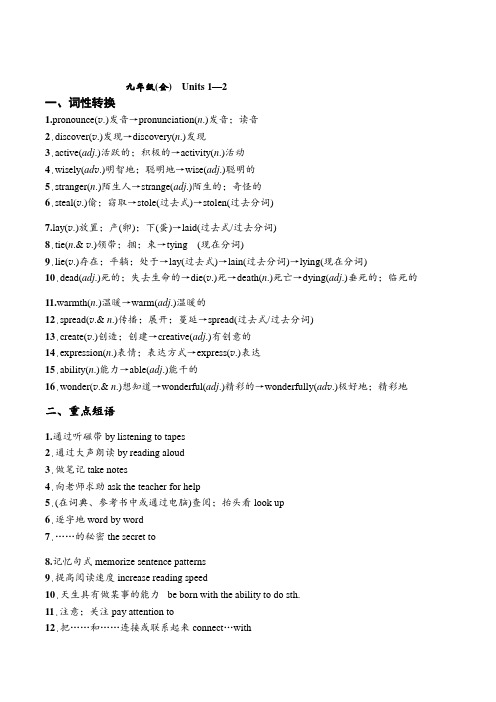
九年级(全)Units 1—2一、词性转换1.pronounce(v.)发音→pronunciation(n.)发音;读音2.discover(v.)发现→discovery(n.)发现3.active(adj.)活跃的;积极的→activity(n.)活动4.wisely(ad v.)明智地;聪明地→wise(adj.)聪明的5.stranger(n.)陌生人→strange(adj.)陌生的;奇怪的6.steal(v.)偷;窃取→stole(过去式)→stolen(过去分词)y(v.)放置;产(卵);下(蛋)→laid(过去式/过去分词)8.tie(n.& v.)领带;捆;束→tying(现在分词)9.lie(v.)存在;平躺;处于→lay(过去式)→lain(过去分词)→lying(现在分词)10.dead(adj.)死的;失去生命的→die(v.)死→death(n.)死亡→dying(adj.)垂死的;临死的11.warmth(n.)温暖→warm(adj.)温暖的12.spread(v.& n.)传播;展开;蔓延→spread(过去式/过去分词)13.create(v.)创造;创建→creative(adj.)有创意的14.expression(n.)表情;表达方式→express(v.)表达15.ability(n.)能力→able(adj.)能干的16.wonder(v.& n.)想知道→wonderful(adj.)精彩的→wonderfully(ad v.)极好地;精彩地二、重点短语1.通过听磁带by listening to tapes2.通过大声朗读by reading aloud3.做笔记take notes4.向老师求助ask the teacher for help5.(在词典、参考书中或通过电脑)查阅;抬头看look up6.逐字地word by word7.……的秘密the secret to8.记忆句式memorize sentence patterns9.提高阅读速度increase reading speed10.天生具有做某事的能力be born with the ability to do sth.11.注意;关注pay attention to12.把……和……连接或联系起来connect…with13.写下write down14.增加(体重);发胖put on15.洗净;清除wash away16.射下shoot down17.摆开;布置lay out18.大喊;喊出call out19.与某人分享某物share sth.with sb.20.最终成为;最后处于end up三、重点句型1.—__How__ do you study for a test? 你是如何备考的?—I study __by__ working with a group.我通过小组学习的方式学习。
英语九年级1-14知识点
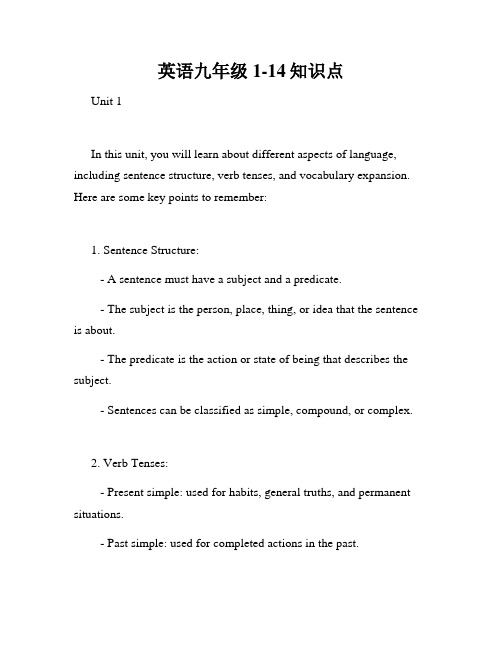
英语九年级1-14知识点Unit 1In this unit, you will learn about different aspects of language, including sentence structure, verb tenses, and vocabulary expansion. Here are some key points to remember:1. Sentence Structure:- A sentence must have a subject and a predicate.- The subject is the person, place, thing, or idea that the sentence is about.- The predicate is the action or state of being that describes the subject.- Sentences can be classified as simple, compound, or complex.2. Verb Tenses:- Present simple: used for habits, general truths, and permanent situations.- Past simple: used for completed actions in the past.- Present continuous: used for actions happening at the moment of speaking.- Past continuous: used for actions that were in progress at a specific time in the past.- Present perfect: used for actions that started in the past and continue into the present.- Past perfect: used for actions that occurred before a specific time in the past.3. Vocabulary Expansion:- Expand your vocabulary by learning new words and phrases.- Use context clues to understand the meanings of unfamiliar words.- Practice using synonyms, antonyms, and word families to improve your word choice.Unit 2In this unit, you will focus on reading and listening skills, as well as grammar rules. Here are the main points to remember:1. Reading Skills:- Skim the text to get a general idea of the content.- Scan the text to find specific details or information.- Read actively by taking notes and highlighting important points.2. Listening Skills:- Listen for general understanding, specific information, and details.- Take notes while listening to help you remember important points.- Practice listening to different accents and speech speeds to improve comprehension.3. Grammar Rules:- Use comparative and superlative forms of adjectives to make comparisons.- Understand the proper use of articles (a/an, the) in different contexts.- Master the rules for forming and using gerunds and infinitives.Unit 3In this unit, you will learn about writing skills and effective communication. Here are the key points to focus on:1. Writing Skills:- Plan your writing by brainstorming ideas and creating an outline.- Write clear and concise paragraphs with topic sentences and supporting details.- Use appropriate transitions to ensure a smooth flow between ideas.2. Effective Communication:- Use active listening skills to understand and respond to others.- Practice speaking clearly and confidently, using appropriate intonation and pronunciation.- Develop effective presentation skills by organizing your ideas and using visual aids if necessary.3. Grammar Rules:- Master the correct use of indefinite pronouns (some, any, everyone, etc.).- Understand the rules for using direct and indirect speech.- Learn how to form and use the future tense.Unit 4In this unit, you will explore different types of texts, such as narratives and informational texts. Here are the main points to remember:1. Narrative Texts:- Narratives tell a story and typically include characters, setting, plot, and dialogue.- Use descriptive language to create vivid images in the reader's mind.- Follow a logical sequence of events to maintain coherence.2. Informational Texts:- Informational texts provide facts and details about a specific topic.- Use headings, subheadings, and bullet points to organize information.- Use appropriate sources and cite them correctly.3. Grammar Rules:- Understand the correct use of prepositions in different contexts.- Master the rules for forming and using the passive voice.- Learn how to use modal verbs to express possibility, necessity, and obligation.Unit 5In this unit, you will learn about different aspects of literature, including poetry and drama. Here are the key points to remember:1. Poetry:- Analyze the structure and poetic devices used in poems (rhyme, rhythm, imagery, etc.).- Understand different types of poems, such as sonnets, haikus, and ballads.- Interpret the meaning and themes of poems through close reading.2. Drama:- Learn about the structure and elements of a play, such as acts, scenes, and dialogue.- Analyze the characters, plot, and themes of a play.- Understand stage directions and how they guide actors and directors.3. Grammar Rules:- Review the correct use of conjunctions to connect words, phrases, and clauses.- Understand the rules for forming and using conditionals (if clauses).- Practice using reported speech in dialogues and narratives.... (continue discussing the remaining units and topics in the same manner)。
人教版九年级英语1-14单元知识点总结
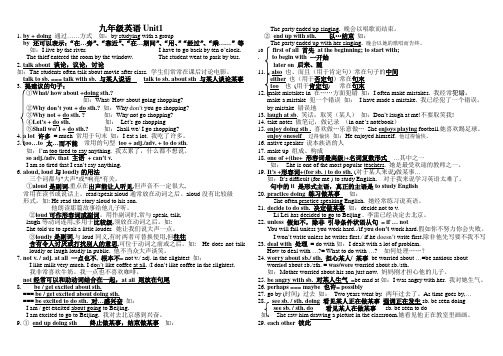
九年级英语Unit11. by + doing通过……方式如:by studying with a groupby 还可以表示:“在…旁”、“靠近”、“在…期间”、“用、”“经过”、“乘……”等如:I live by the river. I have to go back by ten o’clock.The thief entered the room by the window. The student went to park by bus.2. talk about 谈论,议论,讨论如:The students often talk about movie after class. 学生们常常在课后讨论电影。
talk to sb. === talk with sb. 与某人说话talk to sb. about sth 与某人谈论某事3. 提建议的句子:①What/ how about +doing sth.?如:What/ How about going shopping?②Why don’t you + do sth.?如:Why don’t you go shopping?③Why not + do sth. ? 如:Why not go shopping?④Let’s + do sth. 如:Let’s go shopping⑤Shall we/ I + do sth.?如:Shall we/ I go shopping?4. a lot 许多= much 常用于句末如:I eat a lot. 我吃了许多。
5. too…to 太…而不能常用的句型too + adj./adv. + to do sth.如:I’m too tired to say anything. 我太累了,什么都不想说。
so adj./adv. that 主语+ can’t v.I am so tired that I can’t say anything.6. aloud, loud与loudly的用法三个词都与"大声"或"响亮"有关。
九年级英语期末总复习应知应会( Units 1-12 )
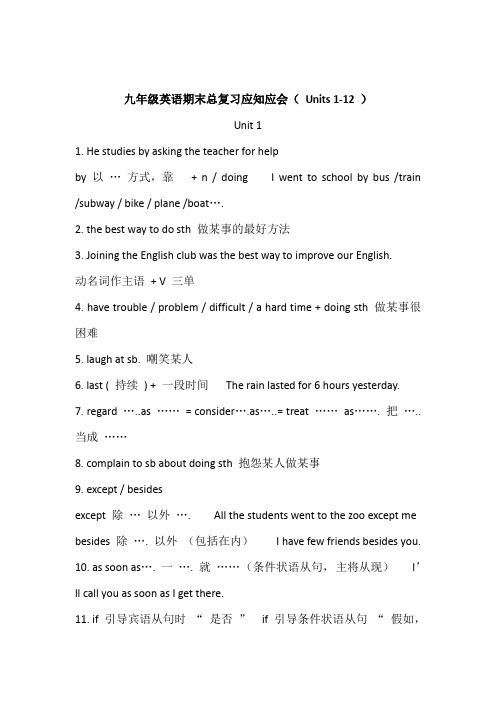
九年级英语期末总复习应知应会(Units 1-12 )Unit 11. He studies by asking the teacher for helpby 以…方式,靠+ n / doing I went to school by bus /train /subway / bike / plane /boat….2. the best way to do sth 做某事的最好方法3. Joining the English club was the best way to improve our English.动名词作主语+ V 三单4. have trouble / problem / difficult / a hard time + doing sth 做某事很困难5. laugh at sb. 嘲笑某人6. last ( 持续) + 一段时间The rain lasted for 6 hours yesterday.7. regard …..as ……= consider….as…..= treat ……as……. 把….. 当成……8. complain to sb about doing sth 抱怨某人做某事9. except / besidesexcept 除…以外…. All the students went to the zoo except me besides 除…. 以外(包括在内)I have few friends besides you.10. as soon as…. 一…. 就……(条件状语从句,主将从现)I’ll call you as soon as I get there.11. if 引导宾语从句时“是否”if 引导条件状语从句“假如,如果”,主句为将来时,从句用一般现在时。
I don’t know if it will rain ,if it rains ,I won’t go out.宾从条从Unit 21. 1 )used to do sth 过去常常做某事He used to do homework until 10 pm.2 )be used to doing sth 习惯于做某事I’m used to getting up early. She is used to living alone.3 )be used to do sth = be used for doing sth 被用于做某事Knife is used to cut things = Knife is used for cutting things.2. afford 买得起,负担得起(…的费用)I can’t afford a new car. afford to do sth 负担得起做某事3. get in trouble with 与…. 发生纠纷be patient with sb of sth 在某事上对某人很耐心4. be proud of = take pride in + n / doing 对….. 感到骄傲5. It ‘s time (for sb) to do sth / It’s time for sth 是(某人)该做某事的时候了Unit 31. be allowed to do sth 被允许做某事allow sb to do sth 允许某人做某事allow to do sth 允许做某事2. (1) instead of + n /pre / vingShe prefers milk instead of (=rather than) coffee. We’d like to gosightseeing instead of staying at home.(2) instead 相反的、代替。
- 1、下载文档前请自行甄别文档内容的完整性,平台不提供额外的编辑、内容补充、找答案等附加服务。
- 2、"仅部分预览"的文档,不可在线预览部分如存在完整性等问题,可反馈申请退款(可完整预览的文档不适用该条件!)。
- 3、如文档侵犯您的权益,请联系客服反馈,我们会尽快为您处理(人工客服工作时间:9:00-18:30)。
中考英语第一轮复习资料课本重点复习(新目标)九年级英语上期期末复习(Unit 1-12)Unit 1一、He studies by asking the teacher for helpby 以…方式,靠+ n / doingI went to school by bus /train /subway / bike / plane /boat….二、the best way to do sth做某事的最好方法三、Joining the English club was the best way to improve our English.动名词作主语+ V三单四、have trouble / problem / difficult / a hard time + doing sth做某事很困难五、laugh at sb. 嘲笑某人六、last (持续) + 一段时间The rain lasted for 6 hours yesterday.七、regard …..as …… = consider….as…..= treat …… as…….把…..当成……八、complain to sb about doing sth抱怨某人做某事九、except / besidesexcept 除…以外…. All the students went to the zoo except me besides 除….以外(包括在内)I have few friends besides you.十、as soon as….一….就…… (条件状语从句,主将从现)I’ll call you as soon as I get there.十一、if 引导宾语从句时“是否” if引导条件状语从句“假如,如果”,主句为将来时,从句用一般现在时。
I don’t know if it will rain , if it rains, I宾从条从Unit 2一、1)used to do sth 过去常常做某事He used to do homework until 10 pm.2)be used to doing sth 习惯于做某事I’m used to getting up early.She is used to living alone.3)be used to do sth = be used for doing sth 被用于做某事Knife is used to cut things = Knife is used for cutting things. 二、afford 买得起,负担得起(…的费用)I can’t a fford a new car.afford to do sth 负担得起做某事三、get in trouble with 与….发生纠纷be patient with sb of sth 在某事上对某人很耐心四、be proud of = take pride in + n / doing 对…..感到骄傲五、It ‘s time (for sb) to do sth / It’s time for sth是(某人)该做某事的时候了Unit 3一、be allowed to do sth 被允许做某事allow sb to do sth 允许某人做某事allow to do sth 允许做某事二、(1) instead of + n /pre / vingShe prefers milk instead of (=rather than) coffee.We’d like to go sightseeing instead of staying at home.(2)instead 相反的、代替。
常放句末。
I don’t like swimming , I like playing games instead.三、So do we 我也是So +助、be、情态动词+主语“某人也一样”I have to do my homework . So does he .Nor /neither助、be、情态动词+主语“某人也不”Mary didn’t go to the party last ni ght . Neither /nor did I .四、I’m not allowed to get my ears pierced.Get sth done / have sth done这事儿不是主语做的,而是找别人做的。
My bike broke down, I’ll have it repaired.我的自行车坏了,我得找人修理。
五、be strict with sb 对某人严格be strict in sth 在某方面很严格六、be comfortable to do sth做某事很方便七、be good for 对…..有好处。
Vegetable and fruit are good for your health.be good at = do well in + n / pre / doing 擅长….He is good at swimmingbe good to = be friendly to 对…..很友善。
八、have an opportunity to do sth 有机会做某事。
九、语法:不定代词(1) some / any 均为“一些”,+可、不可数名词;some一般用于肯定,any多用于否定或疑问句。
但在疑问句中,当表示说话人希望得到肯定回答或表达请求、建议时应用some.---Would you like some coffee ?---Yes, please. / No, thanks(2)many / muchmany +可数名词much +不可数名词都可与so, too, as, how 搭配。
(1)either / neithereither指两者其一neither 指两者都不either…..or….. 不是…就是….neither…..nor…..既不…也不……十、other , the other , others , the others , another1)other 别的、其他的2)the other 两者中另一个one …….., the other……..一个…另一个……3)others 泛指别的人或物=other + 复数名词some ……, others…..一些…..另一些…..4)the others 特指其余剩下的人或物some….., the others……一些…..,其余的……5)another 任何一个,另一个。
(指三者以上中的任何一个)十一、get in the way of …….妨碍…..十二、On….team . 在…队里He is on the school soccer team.十三、happen 出乎意料的发生take place 有计划的发生两者都没有被动语态this accident has taken place for 5 years. 十四、be serious about + n/ pre / doing 对….很认真十五、succeed (in) doing sth 成功地做某事success n. successful adjUnit 4一、数词+hundred/thousand/million/billion 几百/千/百万/十亿hundreds/thousands/millions/billions+ of 成百的/千的/百万的/十亿的二、辨析bring / take / fetch / carry三、If I were you, I’d wear a shirt and tie.If I had a million dollars, I’d buy a big house.If 的用法:1)在含有非真实条件句的复合句中,表示一种假设,需用虚拟语气,对现在情况的假设,条件从句中用一般过去时(be 动词勇were),主句用would/should/could + V原If they were here, they would help you.2)如果假设情况可能发生,句子用陈述语气,条件从句用一般现在时,主句用将来时。
If he comes, I’ll bring him a present.If it rains tomorrow, we won’t have a picnic.四、invite sb to somewhere.invite sb to do sth五、辨析borrow / lend / keepborrow …from…. (主语)借进I borrowed books from school library.lend…..to ….. (主语)借出Could you lend your dictionary to me?keep 借并保存一段时间(常用于完成时for, since与搭配,代替borrow )I’ve kept this story book for a month , and I didn’t return it .六、许多。
(2)a lot of , lots of , some , plenty of 既可修饰可数,也可修饰不可数名词。
(2)a number of + 可数名词复数+V复“大量的”A number of trees are cut down.(3)the number of +可数名词复数+V三单“..的数量”The number of students in our class is 52.(4)amount of , much , a little , little , a bit of , a deal of + 不可数名词+ V三单(5) many , a few , few + 可数名词复数+V复七、(rather) than其后动词的形式,与前面动词的形式保持一致。
I like singing than dancing.宁愿做…而不愿做…..1)would rather do sth than do sth. 2)would like to do sth, than do sth 3)prefer to do sth rather than do sth 4)prefer doing to doing 八、害怕做某事be afraid of doing sth = be terrified of doing sth= be scared of doing sthbe afraid to do sth九、win 赢得比赛、演讲、地位、荣誉beat 击败某人、某队十、辨别noise噪音Don’t make any noise !voice人的嗓音He has a good voice.sound 泛指各种声音The sound of car is too loud.十一、taste v.品尝,尝起来n.味道,品味系动词taste , smell , look , sound , feel + adj十二、语法。
